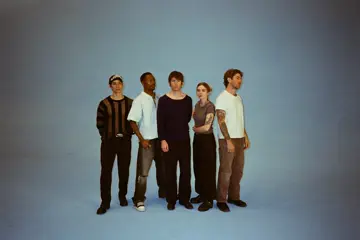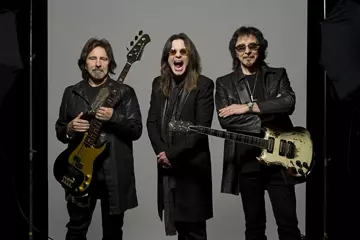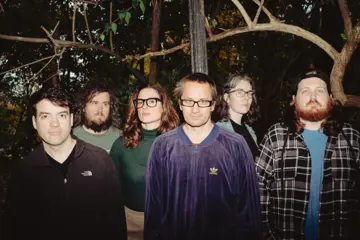It's a cold morning in Brussels and Dave Hosking is still in bed. “A little bit lazy,” he admits. He and the other four members of Boy & Bear have just wrapped up their European tour and are about to head for home, where they'll immediately start the whole thing again. It would be enough to keep anyone in bed.
“This tour wasn't huge – the whole thing was I think twelve or thirteen shows over the UK and Europe – but the last seven were done seven in a row in seven days in four different countries.”
Hosking, however, remains modest – and happy. “Feeling a little bit exhausted,” he continues. “But we'll get a couple of days off when we get home to kind of gather ourselves before we start rehearsals into the Australian tour. That's our job – our life is touring and exhaustion, but it's all for some reason mildly addictive and loveable.”
Surely, at some point – after seven shows in seven days in four countries, for example – playing music would begin to feel less like playing music and more like work.
“Yeah, absolutely. I mean, any job has more stressful moments,” Hosking agrees. “The shows are the easiest bit. The shows are really fun and enjoyable. It's the sitting in the van for eight hours from the UK to Berlin and then getting there and having to get your gear and loading up steps to set up in a venue. I think that's the testing point and after that it's okay. There are still a lot more positives to the job. It's all worth it.”
Plus, Hosking explains, playing overseas is fun. With the anonymity that comes from travel and the lack of expectations you might find in a home crowd, there's more opportunity to experiment.
“I think getting out of Australia and playing shows in different countries around the world is a really beneficial thing,” he says. “It's great. I think you can come out and sort of be whoever you want. It's a fresh crowd and there's a real sort of fresh excitement, which is great and, I dunno, I feel like every time we go overseas and come back I've learnt so much. I've learnt so much about the band and myself as a performer and I think that it's really good like that.
Don't miss a beat with our FREE daily newsletter
“There's no expectations [in Europe]. So, if I walk out on stage and am like, 'You know what, I'm just going to Bruce Springsteen the shit out of this,' it's not a complete shock to people who haven't come to see you before... It's completely fresh, so you're probably allowed to experiment a bit more. The pressure's off a bit more.”
With their European tour wrapped up, now it's our turn. Their Australian tour continues right up until mid-June, with nearly 30 shows listed so far, including a number of small venues in regional areas. With capacities kept intentionally low, some have already sold out and new shows added.
Of the sold out shows, one is not surprisingly in the band's hometown of Sydney, where Boy & Bear began life as Hosking's solo project. That didn't last long. Soon he was collaborating with other musicians to make his solo EP. “These guys all had projects on the side and were also helping me out,” Hosking says of his collaborating band members. And by the time current drummer Tim Hart came onboard, it didn't feel like a solo project anymore. It felt like a band.
In the end, there were five: Hosking, Tim Hart, Jon Hart, Jake Tarasenko and Killian Gavin – all experienced musicians with well-developed other projects and plenty of skills to bring to the table. “They're actually much better musicians than I am,” Hosking admits, laughing. In addition, most are also singer/songwriters in their own right – a situation that could very easily become one of way too many cooks. Not so, according to Hosking.
“It just sort of fit into place,” he insists. “It feels like it's in a better spot now more than ever. I think we've got a really good rhythm and understand the way it works. I dunno, I bring these songs in and as a group we flesh them out and I guess, for some reason, there's no sort of fighting for space there. Everyone knows what their role is and, sometimes through Tim or Killian, the song will get flipped on its head and it sounds much better than it ever would without those guys.”
The diverging backgrounds of the players has assisted too – in causing tension, in challenging creative habits and in allowing the band to create something unique.
“I think to some extent there's an overlap in our listening,” Hosking goes on. “When Tim first came in he was much more pop-driven, Killian very rock and Jake very leftfield; kind of Sigur Ros. But that's a good thing. I think tension is a great thing for creativity. I think that you want that breadth of genres involved because I think it allows you to create something really unique. At the same time, too, you end up having to sometimes wade through these slow conversations and trying to make things do certain things and, I dunno, even in those early days we managed to get through it. I think Jake would have always loved everything to be weirder, but at the same time too he sort of understands where the band's at.”
Boy & Bear are almost certainly a band you've heard of. They're triple j darlings, winning Unearthed in 2009 and three of their songs earned places in 2011's Hottest 100; Feeding Line even made it number four. Last year, they cleaned up at the ARIAs, with debut album Moonfire bagging them five, including Album Of The Year. So when are accolades useful and when do they start to interfere? Hosking appreciates the honour, but tries not to get distracted.
“I think they're great and I think that it's a real honour to be a part of that – with those ARIAs – and I think it's a really great experience. But, as horrible as it sounds, it is sort of irrelevant to the bigger picture to us. None of that is sort of why we do this. I think the key is making sure it doesn't distract people from what we're trying to do. Hopefully it doesn't affect our process at all. In fact, it almost helps us to focus on, 'Okay, this is great but let's get on with the job'.”
They have other ideas for making music, other ideas of what constitutes success.
“The greatest bands in the world don't write songs for awards or songs for radio,” Hosking says. “They write songs to pursue their endeavour of art; make sense of it.”














